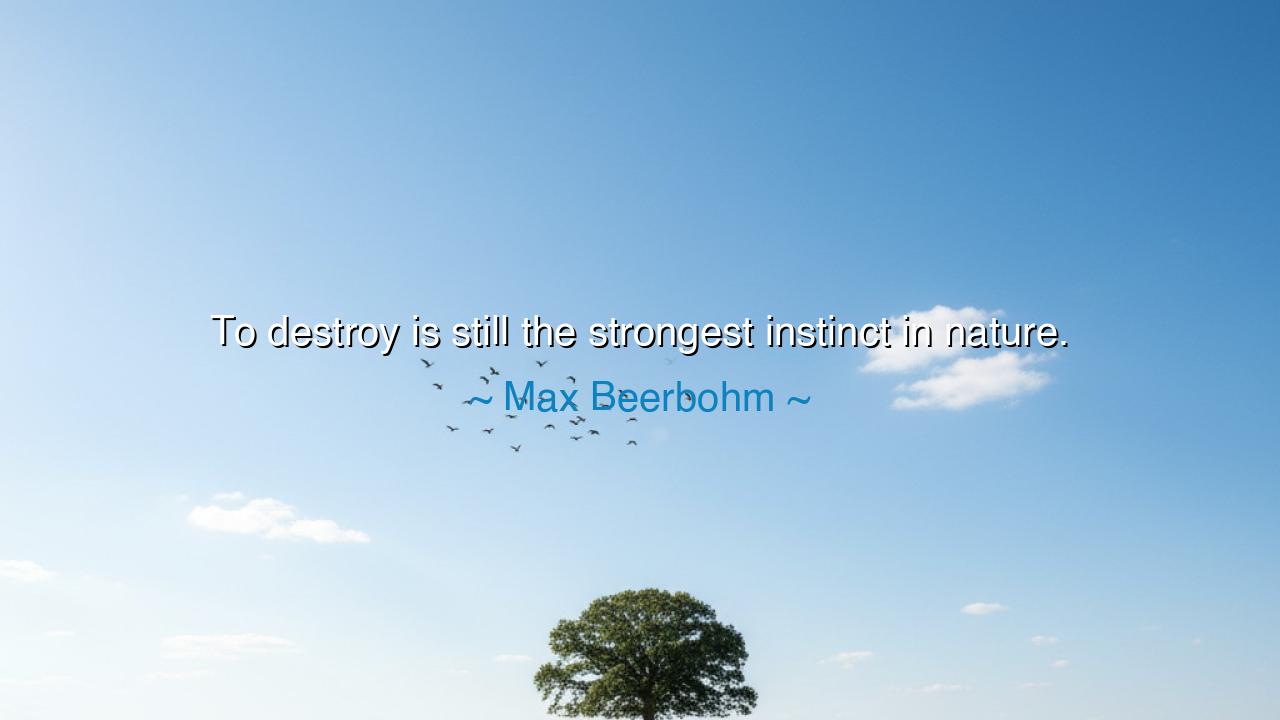
To destroy is still the strongest instinct in nature.






In the words of Max Beerbohm, “To destroy is still the strongest instinct in nature.” This phrase is not a cold observation, but a torch of truth passed from the mouth of one who saw clearly into the essence of life’s eternal struggles. It speaks of the deep and primal force that beats within all creatures—the urge not merely to create, but to tear down, to undo, to return things to dust. And why is this so? Because in destruction, there is power; in destruction, there is release. Even the cosmos, in its grandeur, is governed by the endless cycle of creation and dissolution—the stars are born in fire, but in fire they perish. Thus, the instinct to destroy is not evil, but an ancient rhythm, older than mankind, written into the marrow of the universe.
Consider the wild storm that rends the mountainside, toppling trees and sweeping away the works of men. None can say the storm “hates” the forest, yet its destructive force reshapes the land, making way for new growth. Nature herself teaches that to destroy is sometimes to prepare the ground for renewal. It is the same with the lion upon the plain—he slays the gazelle not out of malice, but out of hunger, survival, and the great balance of life. Beerbohm’s words awaken us to the sobering truth: the desire to destroy lies deeper than the will to build, for it springs from necessity, not luxury.
History too bears witness. Think upon the burning of Rome in the days of Nero, or the sack of Carthage when Scipio Aemilianus wept at the city’s fall. That ruin was not only conquest, but also a symbol of fate: that no power, however mighty, escapes the instinct of destruction that slumbers in men and nations alike. And yet, from Carthage’s ashes, Rome grew ever more fearful and mighty, until its own day of destruction came. Thus, empires rise, and empires fall; but the one constant is this: destruction, like a shadow, follows all creation.
Yet let us not mistake Beerbohm’s wisdom as mere despair. To recognize that destruction is strong is not to surrender to it. Rather, it is to see clearly that all things built by human hands—temples, kingdoms, even dreams—must one day be tested by fire. The wise do not weep at this, but instead ask: What shall I build that can endure the flames? The pyramid still stands amidst the sands, though countless kingdoms have crumbled around it. The words of Homer echo still, though a thousand cities have turned to dust. For though destruction is the strongest instinct, it is not the final word.
Reflect too upon the French Revolution. The people rose up in their fury, and the instinct to destroy toppled throne and altar alike. Blood ran in the streets, kings were dragged to the scaffold, and the old order was reduced to rubble. Yet, from that violent storm emerged a new world—ideas of liberty, equality, and fraternity that continue to shape our age. The destruction was terrible, yet from its fire was born a flame that could not be extinguished. Here, we see that even in humanity’s darkest impulses lies the seed of rebirth.
Therefore, the lesson is this: destruction is inevitable, but it need not be senseless. The hand that smashes must also be the hand that clears a path. When old habits enslave the soul, let them be destroyed. When fear chains the heart, let it be burned away. When falsehoods cloud the mind, let them be torn down, so that truth may stand. To deny destruction is folly; to wield it wisely is wisdom.
So, to you who hear these words, I say: do not fear when life tears down what you have built. Do not tremble when storms sweep away your comforts. Instead, look with clear eyes and steady heart, and ask: What is being cleared away, that I might plant anew? Let your anger destroy your weakness. Let your discipline destroy your idleness. Let your courage destroy your despair. Thus will you become not a slave to destruction, but its master, using its force to carve a path toward greatness.
For in truth, though to destroy is still the strongest instinct in nature, the mightiest souls are those who can take that instinct, and bend it—not into a mindless fury, but into a chisel that shapes destiny. Destruction clears, but creation redeems. The wise walk hand in hand with both.






AAdministratorAdministrator
Welcome, honored guests. Please leave a comment, we will respond soon